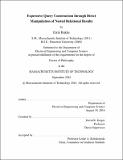| dc.contributor.advisor | David R. Karger. | en_US |
| dc.contributor.author | Bakke, Eirik | en_US |
| dc.contributor.other | Massachusetts Institute of Technology. Department of Electrical Engineering and Computer Science. | en_US |
| dc.date.accessioned | 2017-03-10T14:19:32Z | |
| dc.date.available | 2017-03-10T14:19:32Z | |
| dc.date.copyright | 2016 | en_US |
| dc.date.issued | 2016 | en_US |
| dc.identifier.uri | http://hdl.handle.net/1721.1/107280 | |
| dc.description | Thesis: Ph. D., Massachusetts Institute of Technology, Department of Electrical Engineering and Computer Science, 2016. | en_US |
| dc.description | This electronic version was submitted by the student author. The certified thesis is available in the Institute Archives and Special Collections. | en_US |
| dc.description | Cataloged from student-submitted PDF version of thesis. | en_US |
| dc.description | Includes bibliographical references (pages 127-136). | en_US |
| dc.description.abstract | Despite extensive research on visual query systems, the standard way to interact with relational databases remains to be through SQL queries and tailored form interfaces. This makes the power of relational databases largely inaccessible to non-programmers. This thesis proposes a solution, in two parts. The first contribution of this thesis is a solution to the visual query language problem, that is, the problem of letting end users construct arbitrary database queries through a graphical user interface. We propose the first visual query language to simultaneously satisfy three requirements: (1) query specification through direct manipulation of results, (2) the ability to view and modify any part of the current query without departing from the direct manipulation interface, and (3) SQL-like expressiveness. By directly manipulating nested relational results, and using spreadsheet idioms such as formulas and filters, the user can express arbitrary SQL-92 queries while always remaining able to track and modify the state of the complete query. The second contribution of this thesis is an algorithm for automatically formatting nested relational data using the traditional visual idioms of hand-designed database UIs: tables, multi-column forms, and outline-style indented lists. The algorithm plugs directly into the output stage of our visual query language, and produces the concrete graphics that the user sees and manipulates on the screen during query construction. The algorithm eliminates the need for an application developer to specify low-level presentation details such as label placements, text field dimensions, table column widths, and list styles. Our prototype visual query system gives the user an experience of responsive, incremental query building while pushing all actual query processing to the database layer. We evaluate the query building aspects of our system with formative and controlled user studies on a total of 28 spreadsheet users. The controlled study shows our system outperforming Microsoft Access by 18 points on the System Usability Scale [17]; this corresponds to a 46 percentage point difference on a percentile scale of other studies in the Business Software category. We also evaluate the different layouts that can be produced by our automatic layout algorithm, including via an online user study on 27 subjects. | en_US |
| dc.description.statementofresponsibility | by Eirik Bakke. | en_US |
| dc.format.extent | 136 pages | en_US |
| dc.language.iso | eng | en_US |
| dc.publisher | Massachusetts Institute of Technology | en_US |
| dc.rights | MIT theses are protected by copyright. They may be viewed, downloaded, or printed from this source but further reproduction or distribution in any format is prohibited without written permission. | en_US |
| dc.rights.uri | http://dspace.mit.edu/handle/1721.1/7582 | en_US |
| dc.subject | Electrical Engineering and Computer Science. | en_US |
| dc.title | Expressive query construction through direct manipulation of nested relational results | en_US |
| dc.type | Thesis | en_US |
| dc.description.degree | Ph. D. | en_US |
| dc.contributor.department | Massachusetts Institute of Technology. Department of Electrical Engineering and Computer Science | |
| dc.identifier.oclc | 972900808 | en_US |
